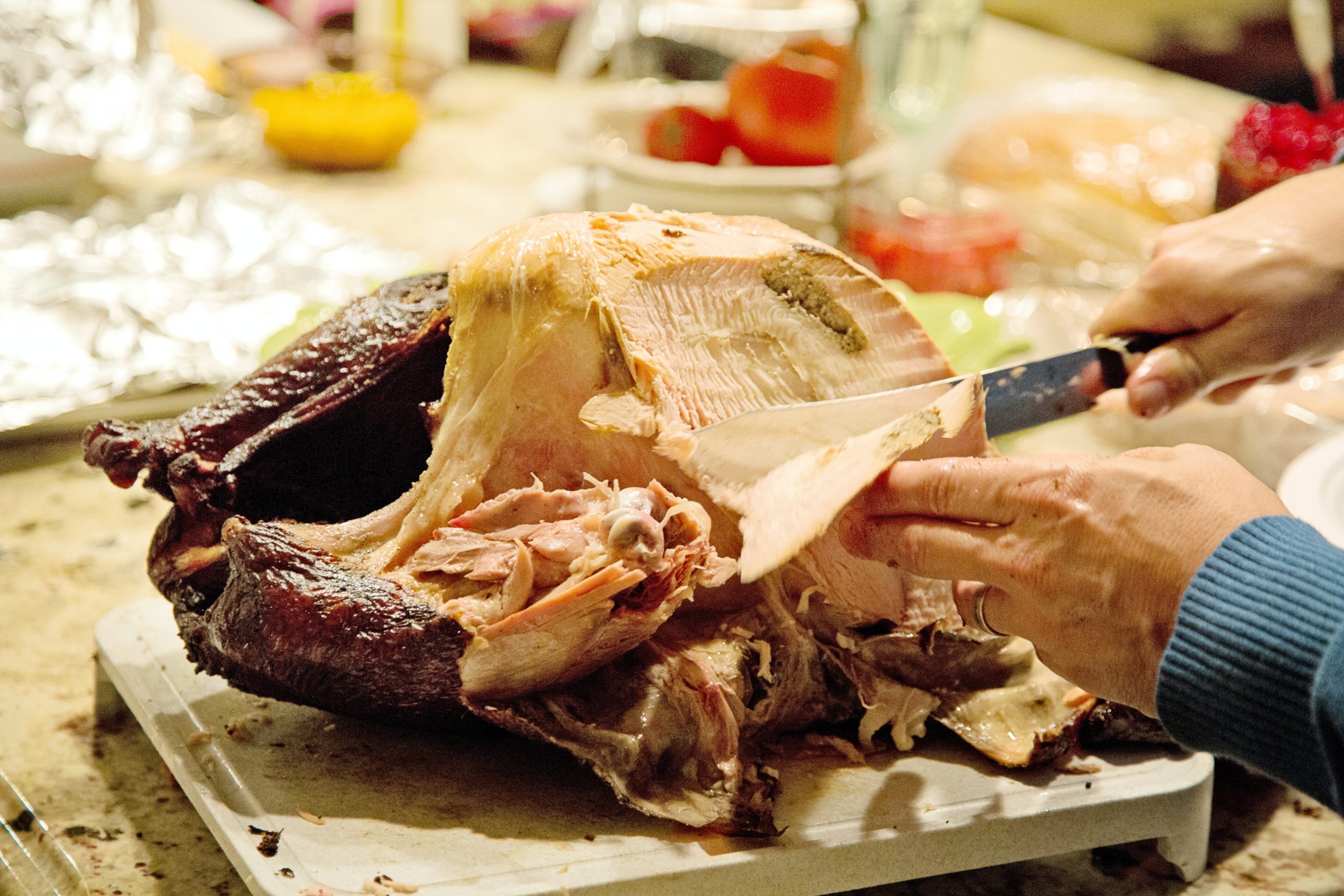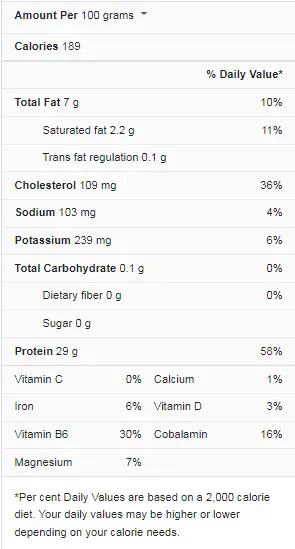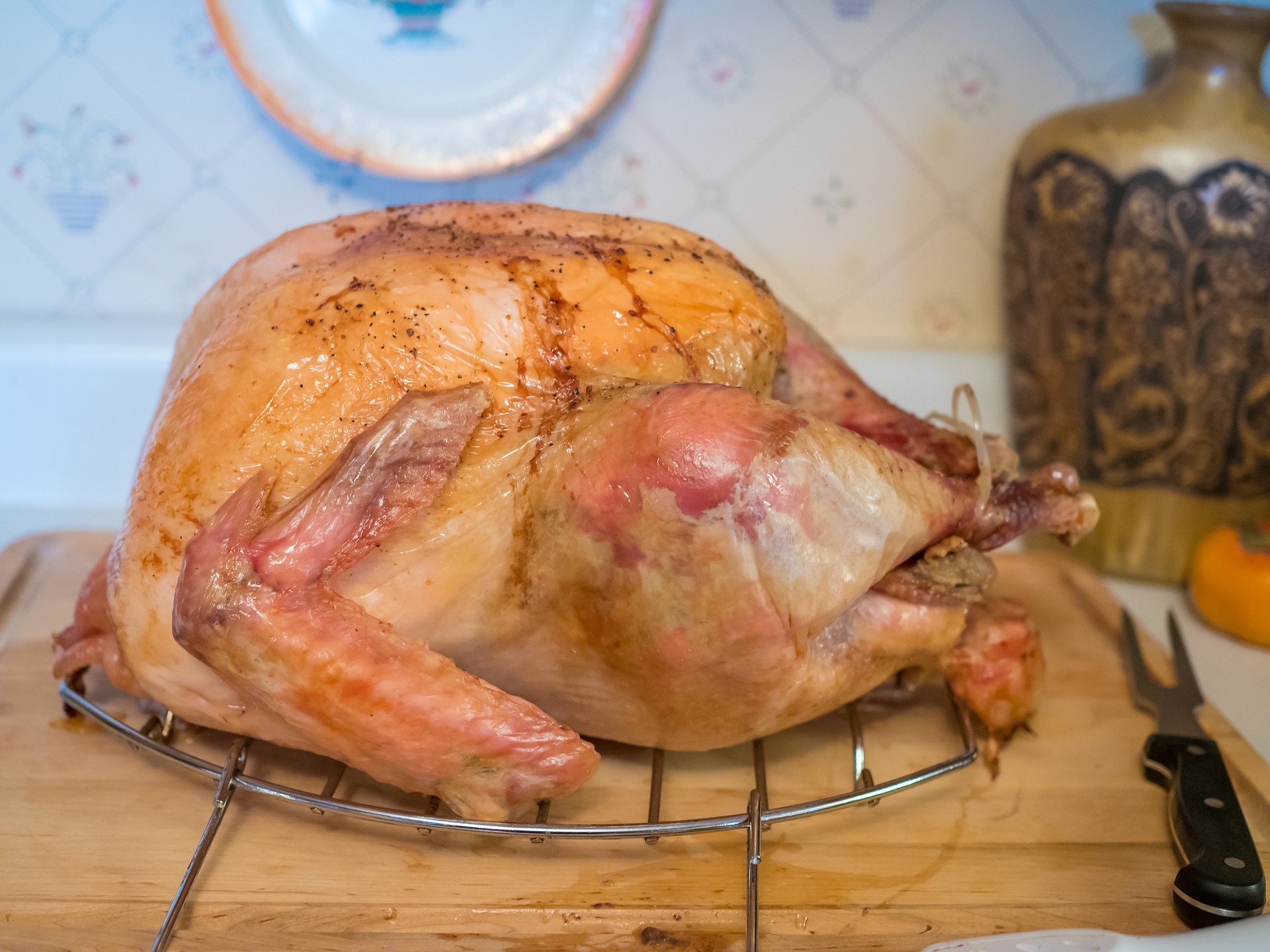Turkey Breast Smells Funny While Cooking
What is the best way to tell whether turkey flesh is terrible? Because bacteria is the most common cause of decomposing turkey, smelling it for a sulfur odor is a good first clue. Dry, smooth, and odorless ground turkey is ideal. Ground poultry that is mushy, slimy, or sticky can harbor bacteria. You can be sure it's tainted if it's green. Any frozen turkey must also be thawed before cooking.

Turkey Meat Nutrition Facts
How To Tell If Turkey Meat Is Bad?
3 Ways to Tell if Turkey Meat Is Bad:
Smell
- When fresh, raw turkey should have a mild, subtle odor similar to raw chicken. However, if you notice a strong odor coming from your raw turkey, it may have begun to turn.
- The pungent odor emanating from your rotting raw turkey may resemble sulfur burps or rotten eggs in some situations. This is unsurprising given the high protein content of turkey meat.
- Raw turkey meat that has been spoiled may have a gamey odor. Expect a peculiar and unpleasant odor if your raw turkey is rotting.
- If the ground turkey smells foul, you can tell it's rancid right away. The best method to tell right away is to smell it. If the ground turkey smells foul, it's time to dump it. The color and texture of the ground beef can also be used to determine this.
Color
- The skin of a fresh raw turkey is pale white, off-white, light pink, or cream in hue. However, raw turkey's skin color will change as it loses its freshness.
- When the turkey's skin color darkens, it's time to throw it out. For example, if the turkey's pale white or light pink skin has become grey, it should be discarded.
- Something may be wrong if the color of the turkey skin is duller than when you bought it, aside from an outright change in color.
Texture
- If you realize that the skin of your raw turkey meat has gotten slimy, throw it out right away. In raw turkey, sliminess is a sure symptom of rot.
- If the turkey has grown slimy, don't try to taste it or eat it. The presence of slime on a piece of turkey indicates that bacterial activity has increased. As a result, if you prepare this type of turkey flesh, you may become sick with salmonella.
- The "texture and smell" can often determine whether it has been ruined. The turkey's skin may become sticky, and the odor is typically described as "rotten eggs or sulfur," according to Hanes. According to Hanes, finding foodborne germs is more complicated.
Does Turkey Meat Go Bad In The Fridge?
- Ground turkey and chicken usually only last two to three days in the fridge. Freshly ground turkey or chicken has a bright pink color and an almost slight odor.
- Ground turkey can be refrigerated for 1 to 2 days after purchase; the "sell-by" date on the package may expire within that time, but the ground turkey will be safe to use after the expiration date if properly stored.
- Before and after handling turkey, especially if it's raw, make sure to wash your hands. Raw turkey can survive 1–2 days in the fridge if stored properly, while cold cuts can last five days.
- Fresh turkey will keep for 1 to 2 days in the refrigerator. If you wait much longer, the meat may start to spoil. If you won't prepare the bird within 48 hours, store it in the coldest part of the fridge and freeze it.
- Cooked turkey should be used within 3 to 4 days if refrigerated (40°F or less). Bacterial growth is slowed but not stopped by refrigeration. Never allow leftovers to sit out at room temperature.
- If you notice a slimy or blackish appearance, throw it out. There is a possibility that it contains salmonella or E. coli. If the skin is green, grey, or yellow, it will likely be spoiled. If the meat is slimy or has an unpleasant smell, it is probably wrong. If the skin or juices are sour, they may contain mold. While this is rare, it can occur when the turkey has too much moisture. If the skin is moist and has a mushy texture, it could be spoiled.

How Long Is A Fresh Turkey Good In The Fridge?
- Raw turkey can survive 1–2 days in the fridge if stored properly, while cold cuts can last five days. How long will cooked turkey keep in the refrigerator? If you have cooked turkey leftovers, they should survive 3–4 days in the refrigerator.
- Purchase a fresh turkey one to two days before you intend to prepare it. If the manufacturer's label specifies a 'best-by' or 'use-by' date, you can store fresh poultry in the refrigerator until that date, and these by' dates on the label should not be followed.
- How do I store turkey in the refrigerator? According to UK Food Safety rules, raw turkey can be kept in the fridge for one to two days if purchased ahead of time. Cool the meat to room temperature as quickly as possible once you've finished eating it.
- A raw, fresh turkey should be kept in the refrigerator for no more than two days. So, if you want to buy fresh and preserve it that way, you'll have to get it shortly before Thanksgiving.
- There is no magic timetable for when you should get your turkey, but the earlier you get it, the better. Depending on their size, turkeys can take anywhere from two to eight days to defrost in the refrigerator, so buy them at least that far ahead of time, if not sooner.
What Happens If You Eat Bad Turkey?
- "If you eat something past its expiration date and it's ruined, you could get food poisoning," said Summer Yule, MS, a registered dietitian nutritionist. Fever, chills, stomach cramps, diarrhea, nausea, and vomiting are signs of foodborne sickness. Undercooked turkeys can harbor various bacteria, viruses, germs, and other toxins that make people sick.
- The onset of food poisoning symptoms can take a long time. In most cases, illness begins within one to three days. However, symptoms can appear anywhere between 30 minutes and three weeks after consuming infected food. The length of time it takes to recover depends on the bacterium or virus that caused the disease.
- Germs can be found in turkey and turkey juice, making you and your family sick. For example, Salmonella, Clostridium perfringens, Campylobacter, and other bacteria can be found in turkey. Cooking an entire bird or a portion of it, such as the breast, requires careful attention.
- Washing your turkey or any other fowl or meat is not a good idea. By spraying germs onto cooking utensils, kitchen counters, and anything within reach, including yourself, washing chicken can spread germs. Any bacteria, including Campylobacter, can be killed by thoroughly cooking them.
5 Health Benefits Of Turkey Meat
Rich in protein
- Turkey is lean meat that is lower in fat and higher in protein than chicken. It is a fantastic choice for people who want to cut down on their fat intake. However, the meat's high protein and low-fat content cooks rapidly and dry. To conserve moisture, various techniques, including brining, adding fattier ingredients, and jointing the bird for more even cooking, may be effective.
- Poultry meat protein is of 'excellent quality,' delivering all nine essential amino acids required for growth and repair and being a sort that human bodies can easily access and use.
Good source of B vitamins
- Turkey meat is a good source of B vitamins, such as B3, B6, and B12. These vitamins are required for energy synthesis, cognitive function, and red blood cell creation.
Good source of minerals
- Turkey meat is high in selenium, zinc, phosphorus, and iron, which helps to improve thyroid function, immunity, bone health, and energy production. Certain minerals, such as iron, are more abundant in darker pieces of meat, such as the leg and thigh.
Low in fat
- Poultry flesh, unsurprisingly, is high in "fast-twitch" muscle, which is used for brief bursts of energy like flapping the wings and scurrying away from predators. This is why bird flesh contains relatively little fat, with most of it concentrated in and just beneath the skin.
- Fat is a vital part of a balanced diet because it keeps the meat moist, succulent, and flavorful. The fat in turkey flesh is primarily unsaturated, with only about a third of it being saturated. However, the quantity of fat in the bird would vary depending on how it was fed, with some plant-based meals favoring a more considerable polyunsaturated (omega-3 fatty acid) contribution.
- The way we prepare turkey meat affects its fat; fattier meats, such as bacon, are sometimes added to the turkey's leanest areas to help overcome dryness during cooking. Of course, this will impact fat levels, possibly increasing saturated fat levels.
May support heart health
- Turkey's low-fat content, high protein content, and wide range of micronutrients are all reasons why it may be advantageous to your heart health. Higher diets of poultry and fish were linked to a decreased incidence of coronary artery disease in a large observational study of females. Furthermore, it appears that substituting a serving of poultry for a serving of red meat lowered cardiovascular risk by 19%.
Does Spoiled Meat Taste Sour?
- How Does a Bad Steak Taste? While tasting ruined steak is not suggested, meat that has gone bad will have a putrid taste. It's gone wrong if your steak tastes particularly sour or unpleasant.
- The scent of spoiled meat is distinct and unpleasant, and it will make your face twist up. Texture — In addition to smelling bad, rotten meats can feel slimy or sticky to the touch. Color – Rotten meats will change color slightly, and poultry should range from bluish-white to golden.
- It's best to avoid eating raw or spoiled ground beef at all costs. Salmonella and STEC are the most prevalent bacteria linked to food poisoning from ground beef. To limit the danger of infection, thoroughly cook the meat.
Conclusion
Look at the color and smell of the turkey to see whether it's rotten. Meat with slimy skin is usually rotten. The scent is more essential than the hue. If the meat smells fishy, it has gone wrong and should be discarded. Examine the texture of the turkey to determine if it is rotting. It's also conceivable that the sourness process has occurred.
The smell of cooked turkey is a sure sign of rottenness. There should be no nasty or strange odors, and it should also be sliced without producing slime. This type of meat should be discarded because of its slimy texture, indicating a foul odor. It's also worth noting that some people can get enteritis from rotten turkey.
Source: https://cullyskitchen.com/how-to-tell-if-turkey-meat-is-bad/
0 Response to "Turkey Breast Smells Funny While Cooking"
Enviar um comentário